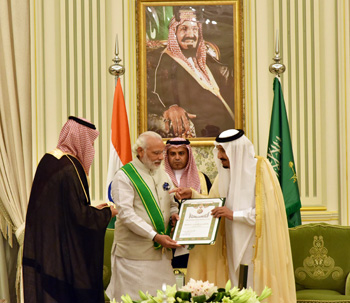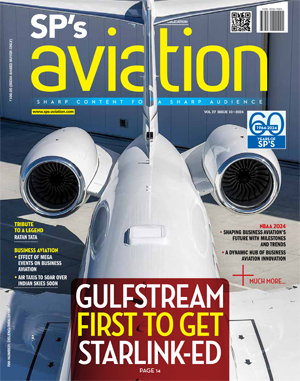INDIAN ARMED FORCES CHIEFS ON OUR RELENTLESS AND FOCUSED PUBLISHING EFFORTS

SP Guide Publications puts forth a well compiled articulation of issues, pursuits and accomplishments of the Indian Army, over the years

"Over the past 60 years, the growth of SP Guide Publications has mirrored the rising stature of Indian Navy. Its well-researched and informative magazines on Defence and Aerospace sector have served to shape an educated opinion of our military personnel, policy makers and the public alike. I wish SP's Publication team continued success, fair winds and following seas in all future endeavour!"

Since, its inception in 1964, SP Guide Publications has consistently demonstrated commitment to high-quality journalism in the aerospace and defence sectors, earning a well-deserved reputation as Asia's largest media house in this domain. I wish SP Guide Publications continued success in its pursuit of excellence.
Modi’s Saudi Arabia Visit countering terrorism and more
 |
By Lt. General P.C. Katoch Former Director General of Information Systems, Indian Army |

What perhaps went unnoticed was that as a prelude to Prime Minister Modi’s visit to Saudi Arabia, the US treasury department announced it had joined hands with Saudi Arabia for joint action to disrupt the fundraising and support networks of al-Qaida, the Taliban, and Lashkar-e-Taiba(LeT) by imposing sanctions on four individuals and two organizations with ties across Afghanistan, Pakistan, and Saudi Arabia. Among the individuals sanctioned are LeT operatives Naveed Qamar, Abdul Aziz Nuristani, and Mohammed Ejaz Safarash, the last of whom bankrolled Zaki-ur Rehman Lakhvi, one of the 26/11 Mumbai terrorist attack mastermind. Not that it would make ‘much; difference on ground among millions of radicals and terrorists Pakistani hatcheries are producing but the announcement is important in backdrop of numerous past reports that US looks the other way to Pakistani export of terror and Saudi funds promoting global terror albeit Saudi Arabia maintains there is no official funding.
The announcement sure came as a huge embarrassment for Pakistan. Obviously the mounting threat that the ISIS poses to the world including to the US and Saudi Arabia has caused these two countries to look more dispassionately at terrorism including in the cyber and CBRN domains. They would also be conscious of the fact that ISI-linked TTP cadres have been fighting in support of ISIS, al-Qaida in Syria and Iraq. PM Modi’s visit to Saudi Arabia was importantly focused on issues like terrorism, security cooperation and economic ties, in the backdrop of traditionally close Saudi Arabia and Pakistan ties. Saudi Arabia wields considerable influence over Islamabad and all new heads of state in Pakistan generally make the first foreign visit to Saudi Arabia. This notwithstanding, India-Saudi Arabia security cooperation too has been steadily growing. It was Saudi Arabia authorities who had facilitated the capture, deportation and arrest of 26/11 plotter Abu Jundal in 2012. Saudi Arabia is a major trade partner of India contributing around 19% of India’s crude oil imports. Trade between the two countries had reached $39 billion in 2014. Saudi Arabia is also home to 2.96 million Indian expatriates who send home over $10 billion in remittances every year. In Riyadh PM Modi met Saudi King Salman who bestowed on him Saudi Arabia’s highest civilian honour, the King Abdulaziz Sash The award is named after Abdulaziz Al Saud, the founder of the modern Saudi state. Other global leaders who have received this award include include Japanese PM Shinzo Abe, British PM David Cameron, US President Barack Obama, Russian President Vladimir Putin and Egyptian President Abdel Fattah el-Sisi. Saudi Arabia’s King Abdullah was the chief guest at New Delhi during the Republic Day 2006.
The two sides signed five agreements, including plans to cooperate in intelligence sharing related to terror financing and money laundering, as well as a labour cooperation agreement and another to promote bilateral investments in the private sector. They also agreed on the need to intensify defence cooperation through mutual visits by military experts and joint military exercises. In a joint statement, King Salman and Prime Minister Modi said they condemned terrorism and rejected any attempts “to link this universal phenomenon to any particular race, religion or culture”. Modi also met Crown Prince and Interior Minister Mohammed bin Nayef and held one-to-one talks with Saudi Foreign Minister Adel al-Jubeir and board chairman of Aramco, Abdulaziz al-Faleh, who is also the health minister. Significantly, Saudi Arabia recently formed the Islamic Military Alliance in which 39 mostly Muslim nations have joined to combat shared threats like terrorism. The two sides held detailed discussions Middle East and West Asia, expressing grave concern regarding security situation in Libya and Iraq and reiterated the importance of peaceful resolution of these issues through dialogue and political negotiations. Modi also invited Saudi Arabia's top businessmen to invest in defence, insurance, railway and oil, assuring them on GST and retroactive taxation. The two sides signed several MoUs on recruitment of general category workers from India, a technical cooperation program on standards, on handicrafts, on exchange of intelligence related to money laundering, terrorism finance etc, and a framework agreement on investment promotion. Finance and trade ministers of both countries were tasked to find ways and means to increase the flow of bilateral investments. Later, Modi also met members of the Indian community and visited residential complex of workers employed by Indian firm Larsen & Toubro (L&T) in Riyadh, where he announced the opening of a worker resource centre. The Modi government has recognized the importance of the relationship with the GCC countries. It has already established a very solid partnership with the UAE and it has now reached out to Saudi Arabia. Some eight million Indians live in the GCC states and send home each year remittances of around $35-40 billion. India-Saudi Arabia ties are important not only from the viewpoint of countering terrorism and energy security but also when Saudi Arabia is on the threshold of transiting from an oil dependent economy to one driven by services, including creating the world’s largest sovereign wealth fund. Enhancement of the bilateral relationship will benefit both with the India economy looking up and ready to absorb more investments and infrastructure.





